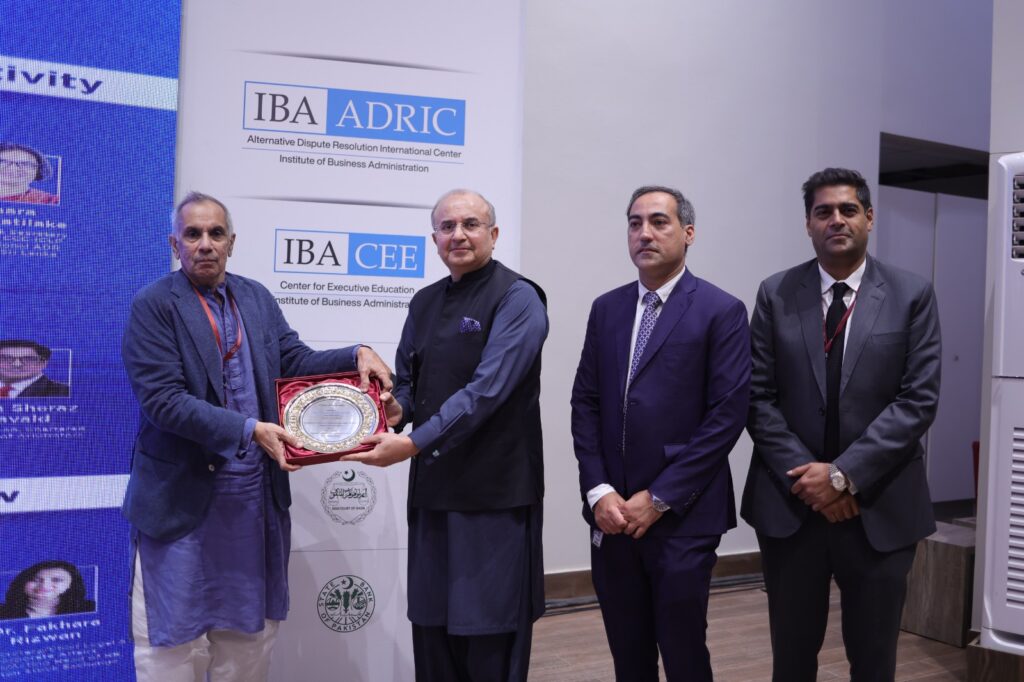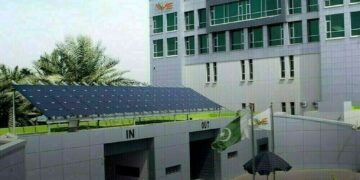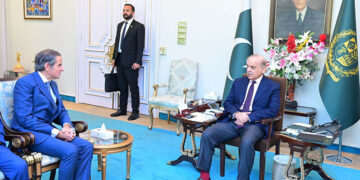Karachi: Alternative Dispute Resolution International Center (ADRIC), Institute of Business Administration (IBA), Karachi, in collaboration with the Commercial Law Development Program (CLDP), U.S. Department of Commerce successfully hosted a seminar titled ‘Pakistan’s ADR Renaissance’, at the City Campus. The event brought together distinguished legal experts, representatives from International ADR Centers, and key stakeholders to discuss the future of dispute resolution in Pakistan with a focus on mediation.
Director IBA-CEE and SIMI Accredited Mediator, Mr. Kamran Bilgrami, delivered the welcome address, setting the stage for an engaging session. He introduced IBA-ADRIC, and its initiatives, and expressed his gratitude towards Keynote Speakers: Hon’ble Senior Puisne Justice, Supreme Court of Pakistan, Syed Mansoor Ali Shah; Hon’ble Chief Justice, Sindh High Court, Muhammad Shafi Siddique; Hon’ble Justice, Lahore High Court, Jawad Hassan; and Hon’ble Justice, Islamabad High Court, MianGul Hassan Aurangzeb.
The mediators of the event, Mr. Bilgrami; and Head of Program & Partnerships, IBA ADRIC and SIMI Trained Mediator, Syed Bulent Sohail, engaged in a discussion on Mediation Landscape in Singapore: Opportunities and Future Prospects for Pakistan. Attorney Advisors, CLDP, U.S. Department of Commerce, Eric Ives and Raquel Martinez, shared insights into the U.S. government’s services and assistance to Pakistan’s ADR movement. This was followed by an enlightening discussion on Mediation by Legal Counsel, SIMC, Sidharth Jha. He conveyed warm regards from the Chairman SIMC, Mr. George Lim.


Executive Director IBA, Dr. S Akbar Zaidi delivered the executive address, offering encouragement and acknowledging the advancements IBA has made in ADR and its promotion in Pakistan. He emphasized that collaboration remains a central theme for IBA, and the Institute is committed to continuing its involvement in collaborative initiatives.
The second part of the seminar focused on a panel discussion titled ‘Bridging Borders: Enhancing International and Regional Connectivity for Economic Growth and Stability’. Mr. Sohail; and Assistant Professor Law, IBA, Ms. Mehreen Nazar moderated the session.
This session was conducted in a bi-panel, which included an engaging panel discussion on the challenges of mediation and the role that technology and digital infrastructure play in strengthening regional connectivity. The first bi-panel featured prominent experts from leading ADR centers in South Asia and Central Asia such as, Attorney Advisor US Department of Commerce, Grishma Pradhan; Managing Director of Case Management Department, AIFC Court & International Arbitration Centre, Almat Igenbayev; Partner Allen & Gledhill LLP, Singapore, Afzal Ali; Partner – Tokyo Head of International Arbitration, DLA Piper, Japan, Tony Andriotis; and Director & Secretary General, CCC-ICLP International ADR Center, Sri Lanka, Dhara Wijayatilake.
The second bi-panel featured the panelists, Senior Fellow, Center for Law & Religion, Emory University & Fulbright Specialist, Dr. Jo DeLaGarza-Chitlik; Vice Chairman Maldives International Arbitration Center, Aseel Hassan; Japan Representative, SIMC, Yuko Nitta; Chairperson, Chartered Institute of Arbitrators, Mian Sheraz Javaid; and Former General Secretary NEPCA, Nepal, Gyanendra Prasad Kayastha. The panel discussed practical ways to adopt and institutionalize mediation in Pakistan so that the law and dispute resolution mechanisms are galvanized to address the burgeoning impact of Alternate dispute resolution in Pakistan.
Secretary Law and Justice Commission, Pakistan, Ms. Riffat Inam presented a special address where she emphasized the practices that Pakistan is adopting for promotion of ADR in Pakistan. It was discussed that the Supreme Court has formed an active ADR task force the members of which are working diligently in promulgating a legal framework for mediation and ADR in Pakistan.
In his keynote address, Justice Jawad Hassan highlighted that Pakistan is on the right track in adopting ADR practices. During his recent visit to London, a leading jurisdiction in dispute resolution, he observed that Pakistan is making impressive progress in this area. This recognition from such a prominent legal center serves as evidence that Pakistan is advancing in its ADR efforts.


Justice Attique Shah informed the audience about the significance of ADR and its effective impact on reducing the caseload of the judiciary. He also emphasized the legal provisions of the ADR Act and their significance.
Justice Muhammad Shafi Siddiqui stressed the importance of focusing on all forms of ADR, not just mediation, especially given Pakistan’s significant case backlog. To effectively reduce this backlog, it is essential to leverage the full range of ADR techniques. He noted that Karachi has seen a decline in the use of mediation for dispute resolution between 2019 and 2023. Therefore, it is crucial to encourage parties and individuals to choose the ADR method that best suits their needs, rather than solely promoting mediation.
Justice Syed Mansoor Ali Shah commented on the ADR Renaissance theme and enlightened that various industries can be deduced under ADR for effective dispute resolution. He expressed that Pakistan should focus on keeping ADR as a desired dispute resolution mechanism. The seminar concluded with closing remarks that reiterated the importance of ADR in Pakistan’s legal landscape. Mementos were distributed, symbolizing the collaborative spirit and shared commitment to advancing ADR practices in the country.


















